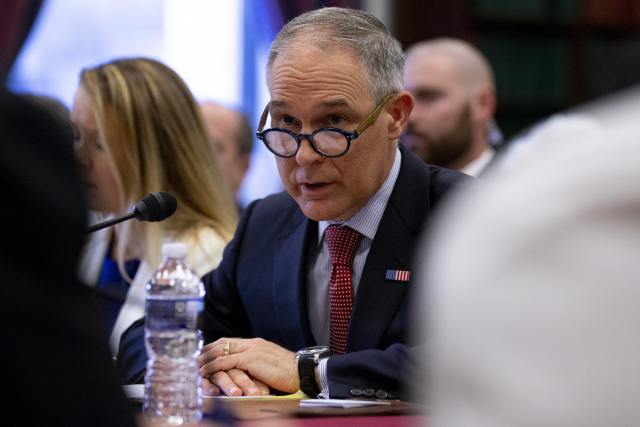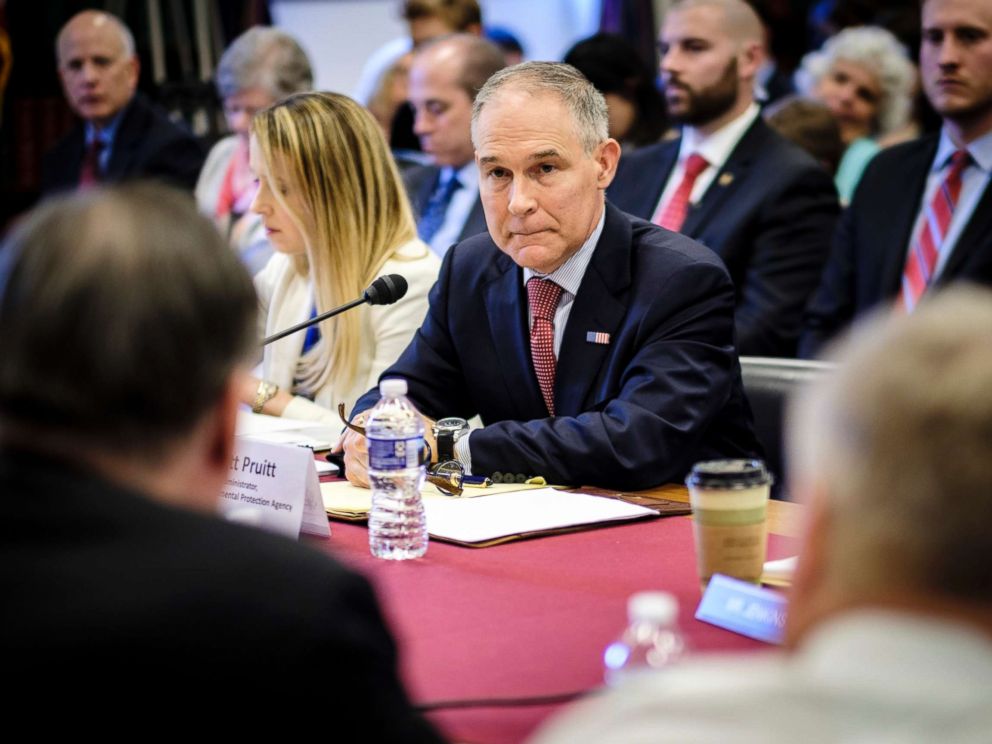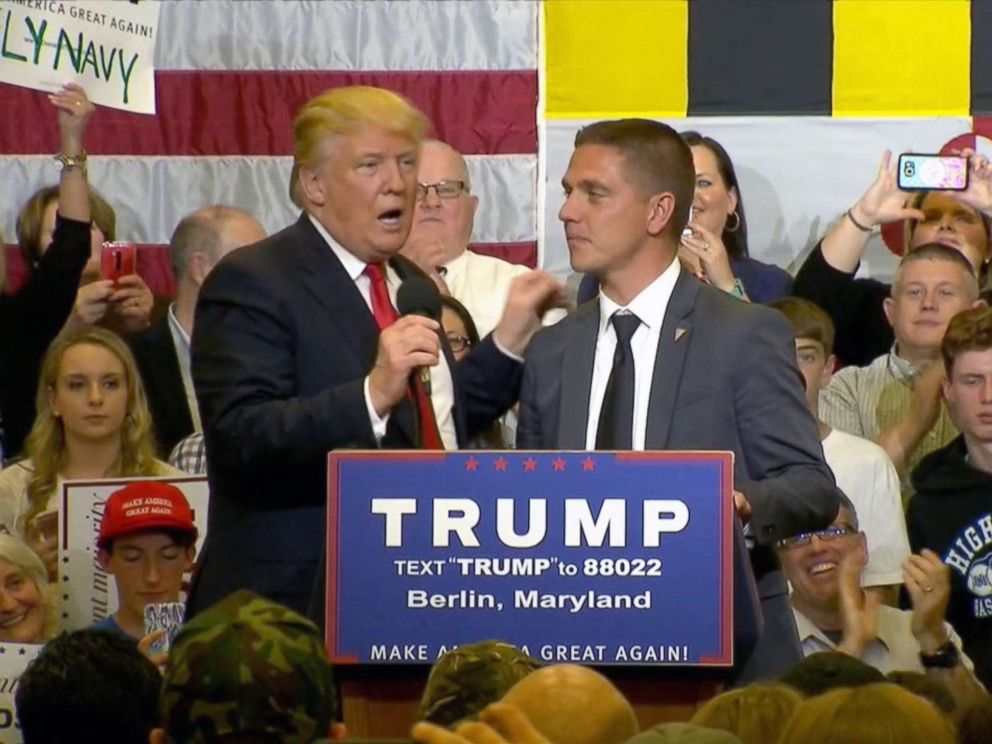HuffPost
The Other Reason Trump Hasn’t Fired Scott Pruitt: His Evangelical Christian Ties
Alexander C. Kaufman, HuffPost April 28, 2018

Taking the stage at the glitzy Mayflower Hotel in Washington last November, Environmental Protection Agency Administrator Scott Pruitt casually quoted the New Testament as he recited his pitch for reimagining the role of the country’s top environmental regulator.
“We as a country have been blessed with tremendous natural resources,” he told the audience gathered for an American Principles Project Foundation gala, according to previously unpublished audio HuffPost obtained. “And to whom much is given, much is required.”
The reference to Luke 12:48 was likely not lost on the crowd gathered that Wednesday night for the conservative religious think tank’s fourth annual Red White and Blue Gala. The event’s brochure, a copy of which HuffPost reviewed, listed the group’s programs on “bioethics and life” and “religious freedom,” and advertised a downloadable white paper responding to the way in which “politics as usual has failed Christian conservatives.”
Rebekah Mercer, the billionaire GOP megadonor and financier of anti-abortion groups, Christian colleges and climate change denial think tanks, bankrolled the confab, according to the brochure.
Brent Bozell, founder of the right-wing Media Research Center, opened the program as the master of ceremonies before Pruitt gave his roughly four-minute speech in acceptance of an award for “human dignity leadership.” The Rev. Thomas Joseph White, a professor at the Catholic Pontifical Faculty of the Immaculate Conception, followed him with an invocation.

This was Pruitt’s hometown crowd. Until 2017, he had served on the board of trustees at the Southern Baptist Theological Seminary in Louisville, Kentucky, an institution that called for “a wife is to submit herself graciously” to her husband and formally opposed “all forms of sexual immorality, including … homosexuality.” The bio on Pruitt’s now-defunct official Twitter account as Oklahoma’s attorney general reads: “Husband, Father, Christ Follower.” He been attending Bible studies with Vice President Mike Pence and other Cabinet secretaries since shortly after taking office at the EPA last year.
While Pruitt’s penchant for rolling back environmental regulations and bolstering the fossil fuel industry is widely touted as the reason President Donald Trump has refused to fire the EPA chief amid a four-week whirlwind of ethical and spending scandals, that largely overlooks Pruitt’s other asset: His reputation as a zealous crusader for conservative Christian politics.
For a president dogged by accusations of adultery and sexual impropriety, that sort of reputation has currency. The ostentatiously devout Pruitt gives Trump cred among evangelical Christian power players at a time when five Republican lawmakers and 170 Democrats in Congress are calling for his resignation. On Thursday, the EPA head testified before two House hearings for a total of six hours, during which Republicans leaped to his defense, arguing the administrator was the victim of “Washington politics,” “innuendo and McCarthyism,” and “a shameful attempt to denigrate the work that’s being done at the EPA.”
Neither the White House nor the EPA returned requests for comment.
“Pruitt is clearly part of the Christian right wing of the Republican Party, and it’s possible that these elite Christian right networks are protecting him, or they’ve sent some kind of message that this is our guy,” said Lydia Bean, author of The Politics of Evangelical Identity. “He’s opposed abortion and worked as an attorney for religious liberty cases, so he checks the right boxes for Christian right evangelicals.”
White evangelicals overwhelmingly support Trump’s job performance, at 61 percent in a December Pew survey, compared to just 32 percent of voters overall. Still, that marks a significant decline from the 78 percent approval in February 2017. Among nonwhite evangelicals, his approval rating plummets, according to a FiveThirtyEight analysis.
Pruitt has played an outsize role in courting leaders on the evangelical right. In September, Trump hosted a dinner with “grassroots leaders,” including evangelical heavyweights such as Concerned Women for America CEO Penny Nance, Faith & Freedom Coalition Chairman Ralph Reed and Tim Goeglein, a vice president at Focus on the Family. In a photo posted to the White House website, Pruitt appears at the table opposite Trump, the only Cabinet secretary in attendance, though his name is not listed in the caption.

As Pruitt’s scandals mount, Christian groups have rallied to defend him. On April 6, the Conservative Action Project published an open letter calling for Pruitt’s “continued tenure at the EPA” and thanking him “for the significant actions he has taken to implement President Trump’s deregulatory agenda.” The list of 186 signatories included Christians for a Sustainable Economy Executive Director David Kullberg, Christian educator Lisa Calvert and Faith Wins President Chad Connelly. Some of the religiously affiliated signatories, such as Anne Schlafly Cori, chair of the “pro-family” Eagle Forum, have a history of backing climate change denial efforts, according to research compiled by the nonpartisan Climate Investigations Center.
White evangelical Christians, more than 80 percent of whom supported Trump in 2016, are the least likely of any religious group in the U.S. to understand the science behind climate change, according to 2015 data from the Pew Research Center. Just 28 percent of white evangelicals believed the planet is warming primarily due to human activity, compared to 41 percent of white mainline Protestants and 56 percent of black Protestants. About 37 percent of white evangelicals don’t believe the climate is changing at all.
In 2005, the National Association of Evangelicals was on the cusp of affirming climate science in a new national platform called “For the Health of a Nation.” But, after passing the board unanimously, the proposal tanked in a rank-and-file vote that followed a massive donation spree by oil, gas and coal-linked groups. Since then, the same dark-money donors ― including Mercer ― who sponsor the network of think tanks that provide contrarian (and readily debunked) research contesting the consensus on climate change have also funded conservative Christian groups. The fossil fuel industry made climate change denial, as Splinter’s Brendan O’Connor described it last year, “the word of God.”
Pruitt hasn’t been shy about proselytizing that view. Last October, Pruitt invoked God’s warning to pagans in the book of Joshua to “choose this day whom you will serve” in a speech announcing a new policy barring scientists who receive EPA research funding from serving on the agency’s advisory boards.
In a February interview with the Christian Broadcasting Network, Pruitt said, “The biblical worldview with respect to these issues is that we have a responsibility to manage and cultivate, harvest the natural resources that we’ve been blessed with to truly bless our fellow mankind.”
In March, Politico published tapes from more than decade ago in which Pruitt disputes evolution: “There aren’t sufficient scientific facts to establish the theory of evolution, and it deals with the origins of man, which is more from a philosophical standpoint than a scientific standpoint.”
The statements have rankled EPA workers.
“It’s terrifying,” said one EPA employee who spoke on condition of anonymity for fear of reprisal. “The impression we are left with is that his faith has led him to counterfactual beliefs.”
The staffer, who identifies as queer, said Pruitt’s past affiliations with groups that take hard-line stances on gender and sexuality “are painful to confront.”
“Knowing that the man I work for every day not only disrespects the agency’s mission but also believes that I, as a pansexual woman, and many other EPA employees … are ‘perversions’ in his belief system, is a heavy weight I feel each day at work,” she said.
Though Pruitt’s reputation for piety may help protect him for now, Bean cautioned that it may not filter down to ordinary evangelical voters.
“He’s not an individual with a mass following, not a household name for the evangelical rank and file,” she said. “I do not think Scott Pruitt has a national brand as an evangelical leader that, by itself, would stop Trump from firing him.”
Pruitt’s legacy could alienate him from moderate evangelicals. Ronald Sider, a professor at the Palmer Theological Seminary in Pennsylvania, called Pruitt’s lead role in pushing Trump to withdraw from the Paris climate accord one of the administration’s “really big, longer-term negative policies,” and said the administrator’s failure to take climate change seriously will define his tenure for years to come.
“It’s really immoral and tragic,” Sider said. “Unless that can be turned around fairly soon, our grandchildren will pay for it.”

 EPA Administrator Scott Pruitt testifies before the House Appropriations Committee on April 26, 2018 in Washington, D.C. Alex Edelman/Getty Images
EPA Administrator Scott Pruitt testifies before the House Appropriations Committee on April 26, 2018 in Washington, D.C. Alex Edelman/Getty Images Pete Marovich/The New York Times via Redux. Scott Pruitt, administrator of the Environmental Protection Agency, testifies before the House Interior, Environment and Related Agencies Appropriations subcommittee on Capitol Hill in Washington, April 26, 2018.
Pete Marovich/The New York Times via Redux. Scott Pruitt, administrator of the Environmental Protection Agency, testifies before the House Interior, Environment and Related Agencies Appropriations subcommittee on Capitol Hill in Washington, April 26, 2018.  ABC. Presidential candidate Donald Trump invites Kevin Chmielewski on stage during a campaign rally in Berlin, Md., April 2017.
ABC. Presidential candidate Donald Trump invites Kevin Chmielewski on stage during a campaign rally in Berlin, Md., April 2017. ABC News. Kevin Chmielewski talks with ABC News, April 30, 2018.
ABC News. Kevin Chmielewski talks with ABC News, April 30, 2018. In this Oct. 11, 2007 file photo, Carl Icahn speaks in New York. Photo by Mark Lennihan/File/AP
In this Oct. 11, 2007 file photo, Carl Icahn speaks in New York. Photo by Mark Lennihan/File/AP


 Getty Images
Getty Images Getty Images
Getty Images Polar Bear sow and two cubs in the Arctic Refuge’s 1002 area targeted for oil drilling. Wikimedia Commons
Polar Bear sow and two cubs in the Arctic Refuge’s 1002 area targeted for oil drilling. Wikimedia Commons
 President Donald Trump speaks on April 13, 2018. REUTERS/Yuri Gripas
President Donald Trump speaks on April 13, 2018. REUTERS/Yuri Gripas
